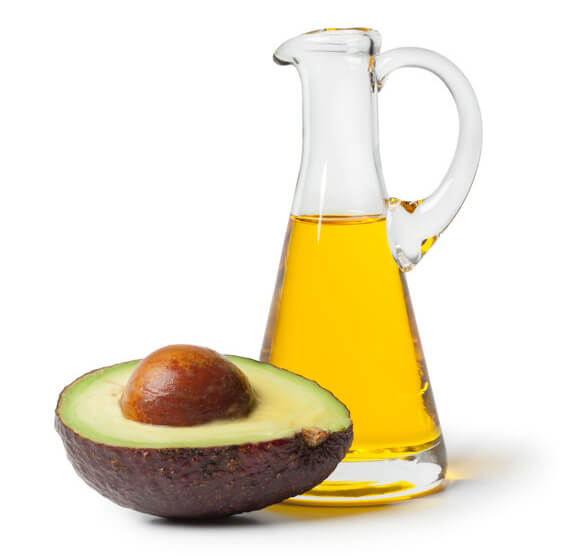For those of you looking for alternative oils to use for your cooking and baking needs, there’s no shortage of varieties to choose from on your grocery store shelf. In fact, the plethora of options at your disposal may be overwhelming at times, as they should be. Oils can vary in many ways, including nutritional content and smoke point. When it comes to avocado oil vs vegetable oil though, there’s one important difference to consider, and it has to do with its fat content.
In short, when comparing avocado oil vs vegetable oil you’ll find that they are nearly identical in terms of calories and macronutrients. However, avocado oil is comprised mostly of monounsaturated fat, whereas vegetable oil contains more polyunsaturated fat.
Let’s examine this in more detail.
What Is Avocado Oil

Avocado oil is a yellow, odorless oil that comes from the pulp of the avocado fruit.
The oil is extracted using solvents at high temperatures, and after the water has been removed. However, there are also cold-press varieties of avocado oil that tend to retain more flavor.
How It’s Used
Because of how well it penetrates the skin, avocado oil was originally used as a cosmetic product, but these days it is more commonly used as a substitute for other oils when baking and cooking.
The most notable trait of avocado oil is its high smoke point of nearly 500 degrees Fahrenheit, which is desirable for frying, cooking, and baking.
What Is Vegetable Oil

Vegetable oil is one of the most commonly known types of plant-based oils. It is derived from the seeds of various vegetables and fruits, either by mechanically crushing them or using some kind of solvent, as is the case for avocado oil.
“Vegetable oil” is a fairly broad term that can encompass various types of plant-based oils, such as:
- Olive oil
- Palm oil
- Cottonseed oil
- Canola oil
- Soybean oil
- And more
It’s important to distinguish this descriptor from products labeled as “vegetable oil” in your grocery store. One is a category of oils, and the other is a way of labelling a specific oil product.
“Vegetable oil” as a product typically consists of a blend of various plants. If only one plant is used (such as olives or cottonseeds,) then it will be labelled as such.
How It’s Used
Much like avocado oil, vegetable oil is used for cooking, frying, and baking. However, vegetable oil is also used in a variety of different products, such as:
- Soaps and skin products
- Candles
- Perfumes
- Paints
- Wood treatments
- And more
As you can see, vegetable oil tends to be used in a wider variety of ways than avocado oil is. However, if you’re comparing avocado oil vs vegetable oil then it’s likely because you want to know how they compare as an edible food product, so let’s dig in further.
Avocado Oil VS Vegetable Oil
Let’s have a look at some of the ways in which avocado oil and vegetable oil stack up side-by-side, starting with their nutritional content.
Nutrition Facts
The table below compares the nutrition facts of an equal serving size of avocado oil and vegetable oil:
| Item | Avocado Oil | Vegetable Oil |
| Serving Size | 1 Tablespoon | 1 Tablespoon |
| Calories | 124 | 120 |
| Total Fat | 14 g | 13.6 g |
| Saturated Fat | 1.6 g | 1 g |
| Polyunsaturated Fat | 1.9 g | 8.9 g |
| Monounsaturated Fat | 9.9 g | 3.1 g |
| Carbohydrate | 0 g | 0 g |
| Protein | 0 g | 0 g |
| Sodium | 0 mg | 0 mg |
As you can see, both oils are nearly identical when it comes to calories and macronutrients.
Avocado oil has slightly more calories and significantly more saturated fat per serving. It should be noted though that at serving sizes this small, the additional 0.6 g of saturated fat may be negligible in the context of a daily diet.
Avocado Oil Has More Saturated Fat
If saturated fat is of concern to you then vegetable oil may be a wiser option.
As indicated by a 2017 study published to PubMed, saturated fat intake appears to be linked to higher levels of LDL cholesterol. [source]
Although both are relatively high in unsaturated fat, the one major difference between avocado oil vs vegetable oil is the types of unsaturated fat they’re comprised of.
Avocado Oil Has More Monounsaturated Fats
Although avocado oil has more saturated fat and slightly less unsaturated fat than vegetable oil does, a much higher percentage of its unsaturated fats come from monounsaturated fat.
Monounsaturated fats are fatty acids that are liquid at room temperature.
Displacing saturated fat calories with monounsaturated fat has been associated with various health benefits.
According to the American Heart Association, monounsaturated fats can help reduce bad cholesterol and reduce your risk of cardiovascular health complications, such as heart attacks and strokes.
In addition, they may also have other positive impacts on health, such as:
- Aiding in weight loss
- Reducing cancer risk
- Improving insulin sensitivity
- Reducing inflammation [source]
If boosting your intake of monounsaturated fats is a priority for you then it would be wise to choose avocado oil vs vegetable oil as it has a significantly higher percentage of its fats from monounsaturated fat.
Vegetable Oil Has More Polyunsaturated Fats
The advantage you’ll enjoy when opting for vegetable oil over avocado oil is that it has significantly from polyunsaturated fat than avocado oil does.
Polyunsaturated fat is an essential fatty acid that your body needs to function, but cannot produce on its own. Therefore, it must be consumed through diet.
Polyunsaturated fats serve many purposes in the body, such as:
- Building cell membranes
- Nerve function
- Blood clotting
- Muscle movement [source]
There are two types of polyunsaturated fats — omega-6 fatty acids and omega-3 fatty acids (such as that found in chia seeds.) Vegetable oil is comprised entirely of omega-6 fatty acids.
Much like monounsaturated fats, displacing saturated fat calories in your diet with polyunsaturated fats can have a positive impact on cardiovascular health and reduce your risk of heart attacks and strokes. [source]
If your goal is to get more polyunsaturated fats in your diet then vegetable oil would be the wiser choice as it contains more than four times as much per serving as avocado oil.
Different Smoke Points
Now that we’ve compared the nutritional differences of avocado oil vs vegetable oil, let’s have a look at how they compare when it comes to other aspects, such as cooking and baking.
The smoke point of an oil represents the temperature at which the oil starts to break down (or “smoke”) from exposure to heat.
Smoke point is an important factor to take into consideration when cooking because oil that has begun to break down may affect the flavor of your dish, giving it a burnt or bitter taste. In addition, it also releases free radicals that may be harmful to the body.
Both oils are known for their high smoke points when compared to other oils, but one advantage that avocado oil has over vegetable oil is its higher smoke point of approximately 250 °C, or 482 °F. [source]
Canola oil, on the other hand — a common type of vegetable oil — has a smoke point of 238 °C, or 460 °F. [source]
This means that if you’re going to be cooking something at high temperatures, avocado oil would be the better choice.
Difference In Flavor
The final factor that may influence your decision is taste.
You may be under the impression that avocado oil tastes like avocados, but because of the way that it’s processed, avocado oil is actually flavorless and odorless; much like vegetable oil is.
This means that the difference in taste between avocado oil vs vegetable oil is negligible. The only exception to this would be if you were to opt for the cold-pressed variety of avocado oil, which does retain some of its flavor from the avocado fruit.
So if you’re simply looking for something to cook your food in, the difference is non-existent under normal circumstances.
If you’re looking to add flavor to your dishes then you may want to opt for cold-pressed avocado oil.
In Summary
They say the devil is in the details, which certainly applies to the comparison between avocado oil vs vegetable oil.
Although both are nearly identical in terms of calories and fat content, it’s the type of fat that sets them apart. Avocado oil would be the wiser choice for anyone looking to boost their intake of monounsaturated fats, whereas vegetable oil would be ideal for those seeking more polyunsaturated fats.
Due to its higher smoke point, avocado oil would be the better choice for cooking, frying and baking.
As we already touched on, the difference in flavor is negligible.
Regardless of whichever oil you choose, either one can be a great way to displace some of the saturated fats calories in your diet with more unsaturated fats.

